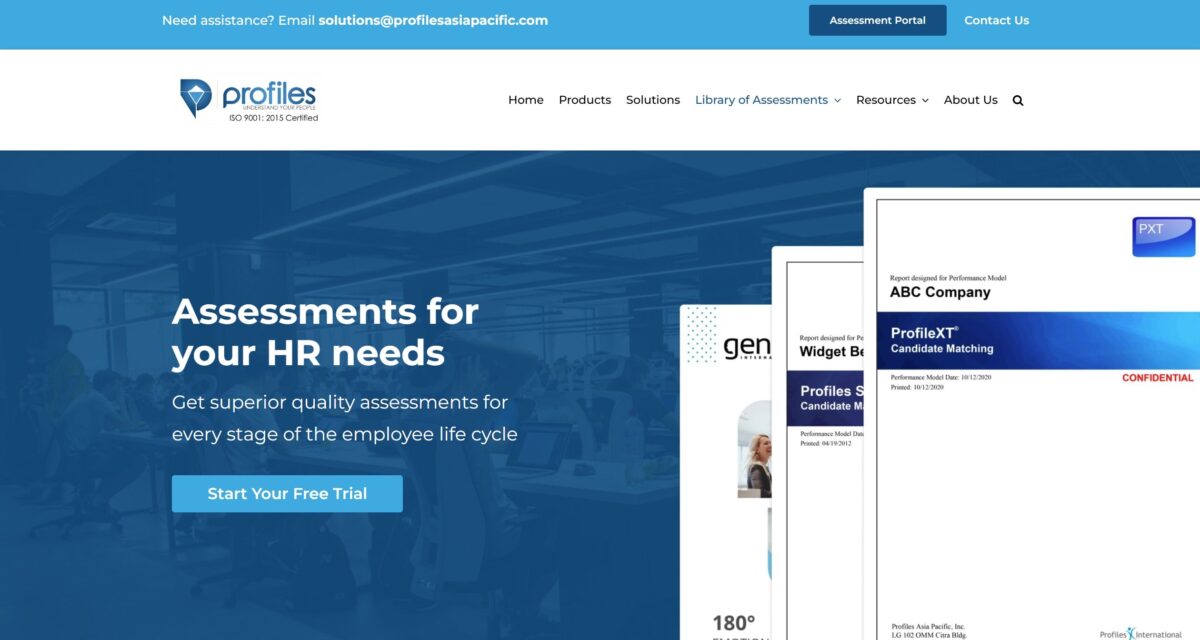Internships are extremely practical avenues for professional development, as they bridge the gap between academic learning and real-world application.
Creating an internship program, meanwhile, isn’t only an opportunity for companies to give back to communities by nurturing future talent, but also a strategic move to attract young hires and infuse fresh perspectives into their ranks.
To help you gain a better understanding of the subject, we’ll dive into what an internship program is, as well as its advantages. Afterwards, we’ll walk you through how you can build an effective one for your organization.
What is an internship program?
To start, an internship program is a structured and supervised professional learning experience designed to provide students and recent graduates with practical work exposure in their field of study.
Such programs’ characteristics vary based on a participant’s educational institution, the type of work they’ll be doing, and their industry’s standards. However, they’re typically short-term, ranging from a set number of hours, to a few months, to a year, and can be paid or unpaid.
Internships also aim to meet the following objectives, all while contributing to the host organization’s projects and goals:
- Offer hands-on experience
- Equip an intern with essential skills
- Provide valuable insights into a specific career path
Why create an internship program?
If you’re wondering why your company would want to establish its own internship program, doing so can yield the following benefits:
An available talent pipeline
Internship programs allow you to identify and develop potential future employees, as you witness first-hand how participants function in an actual work environment.
They give you a preview of how individuals fit your organization and its culture, as well as how they perform their designated jobs. They can supplement your succession planning efforts as well, as the young, promising talent you acquire can fill roles as they’re emptied or created.

If this specific aspect is a key priority for your organization, Profiles Asia Pacific offers succession planning solutions that enable smooth transitions of responsibility.
Fresh perspectives
Each workforce demographic and age group possesses its own unique perspective, and young interns can bring in new ideas and viewpoints shared by their generation.
Welcoming them into your ranks, meanwhile, opens opportunities to foster innovation and creative problem-solving within the organization.
Increased productivity
Internship programs allow more helping hands into your company. These individuals, meanwhile, can assist existing employees with specific projects or routine tasks, boosting the workplace’s overall productivity and letting full-time staff focus on more critical initiatives.
Enhanced employer brand
Rich, well-structured internship experiences can strengthen your organization’s employer brand and establish it as a desirable workplace that provides meaningful learning opportunities.
This type of recognition, meanwhile, allows you to attract young professionals that yearn for career development.
Cost-efficient talent
Acquiring new hires can get quite expensive. According to the Society for Human Resource Management (SHRM), the average cost per hire can reach up to $4,700.
Depending on the internship’s duration and your industry’s standards, a participant’s wages can net you significantly less.
This offers a cost-effective way of meeting your organization’s short-term staffing needs and trialing a new position or potential employee without the long-term commitment.
The individual transitioning to becoming a productive, successful hire, meanwhile, makes your investment more worthwhile.
Creating an internship program: A step-by-step guide
Although creating an effective internship program may seem daunting, the right approach can make the process much simpler. To give your efforts a head start, here’s a basic overview:
Step 1: Define its objectives
A successful internship program must have a clear set of goals. To kick things off, outline what you want to achieve, whether it be the completion of specific projects, developing a pipeline of young, promising talent, or bolstering your employer brand.
Step 2: Design your program’s structure
Here, you’ll need to establish what the program will entail, so decide on:
- The internship’s duration
- Compensation (if applicable)
- Its nature (full-time or part-time)
- The training that interns will undergo, if any
- The scope of work they’ll do
It’s important that you establish clear roles and responsibilities, so that your participants are able to properly mesh with your existing staff and their duties. Ensure that they have meaningful work that aligns with their career interests as well.
Step 3: Develop a recruitment strategy
Attracting qualified talent may require various strategies, so create a recruitment plan that helps you find the right individuals. Your approach may include:
- Partnering with higher education institutions (universities and colleges)
- Posting on online job boards
- Attending job fairs and career talks
- Leveraging social media
Step 4: Create a selection process
Sifting through internship candidates can become time-consuming, so develop a thorough, standardized selection process.
This can include resume reviews, interviews, and evaluations, but what’s vital is that you focus on people whose skills and aspirations align with your company’s needs.

If you need help with intern selection, we also provide comprehensive assessments that measure an individual’s role and cultural fit. They measure aspects such as:
- Their cognitive abilities
- Core behavioral traits
- Learning capacity
- Strategic insight
- Problem-solving, communication, teamwork, and leadership skills
If you want to maximize our offering, just reach out!
Step 5: Take your interns through proper onboarding
Your organization’s onboarding process introduces your company’s culture, policies, and goals, so make sure you deliver a stellar first impression. In this step, make sure to do the following:
- Provide training and resources: Incorporating this into onboarding allows interns to have a productive start.
- Assign mentors: Experienced employees who can act as guides and provide feedback lets interns quickly integrate into the team and adjust to their daily activities.
- Set goals and expectations: Clear performance barometers give interns a clear understanding of what their roles aim to achieve, and these can push them to shine.
Step 6: Evaluate and improve
One of the best ways to ensure the success of your internship program is to analyze its end results, identify any problem areas, then make the necessary adjustments. You can refine your program further by incorporating these practices:
- Regularly reviewing your interns’ progress: Doing this throughout the program’s duration, then providing constructive feedback helps participants acclimate to work settings and develop their skills.
- Gathering feedback: Your interns’ and their supervisors’ first-hand experiences can give you extremely valuable insights, as they’re the ones who go through the program. So, ask for their input.
- Adding an extra layer of evaluations: At the end, you can have interns undergo assessments once more, as their measurements can indicate the effectiveness of your program.
9 Tips for a happy intern experience
At this point, the overall vision for your internship program should be taking shape. To make sure you and your interns maximize your working relationship, however, here are some helpful tips.
1. Assign a supervisor
Interns may typically be adult undergraduates or graduates who are responsible for themselves, but their work experience will be limited. So, as previously mentioned, having senior employees or managers act as mentors is critical to your program’s success.
A reliable individual with significant experience in your company or industry can closely work with interns and help them get used to a professional environment. They can also provide actionable feedback about behaviors or skills that participants need to work on.
2. Maximize their talents
It’s easy to assume that, because interns have little to no experience, they can’t handle actual work challenges or haven’t refined enough skills.
However, with just a bit of guidance, interns can surprise you with their capabilities. Often, these recent additions to the workforce bring fresh takes on professional matters, which your company shouldn’t ignore.
3. Make it a learning experience
An intern isn’t an employee and doesn’t enjoy the same benefits as one. The primary rewards they’ll receive, which are primarily why they applied for your program in the first place, are the knowledge, skills, and experiences they’ll gain while on the job.
In fact, according to the University of Wisconsin-Madison’s National Survey of College Internships (NSCI) 2021 Report, 67.9% pursue an internship to gain experience in a specific field.
So, keep in mind that the working relationship goes both ways. Your program isn’t just for acquiring cost-efficient workers. Ensure that the tasks you assign and resources you provide allow interns to learn new things and give them a head start in their careers.
4. Provide meaningful work
Give your interns valuable work, not just “busy work”. Too many companies make the mistake of using program participants as secretaries. They’re qualified individuals with an array of skills, devoting time and effort to toil for you and learn from you.
So, assign tasks that are relevant to their field of study and contribute to their professional growth. Avoid relegating them to menial or repetitive tasks.
5. Include them in your team and company culture
Being newcomers who aren’t fully hired, and may not end up staying for the long haul, a young intern may likely feel out of place in your organization. Nevertheless, they’re part of your workforce and should be treated as such.
To foster a welcoming and inclusive culture where interns feel like they belong:
- Introduce them to everyone
- Encourage them to participate in company events
- Include them in your employee inductions
- Have them join team meetings and gatherings
By doing these, your program participants will feel more at ease and not be hesitant to play a proactive role.
6. Regularly give feedback
As mentioned, feedback can help interns properly adapt to a professional environment. So, provide it continuously and constructively. Conduct periodic check-ins where you and a program participant can discuss their strengths, weaknesses, and areas of improvement.
7. Ask for input
Feedback should also go both ways. One of the best ways to improve your internship program is to seek input from the participants themselves, then make strategic changes based on their insight.
Throughout the program’s duration until their leaving, regularly ask interns for their opinions on the general experience so that your company can refine it. Doing so makes participants feel valued as well, and can compel them to apply for a role in your organization.
Don’t forget to gather the perspectives of the assigned supervisors as well, as they can identify the characteristics an ideal intern should possess. For example, they can point out any behaviors that gave rise to problems, then propose tweaks for the screening process.
8. Encourage networking
Being in such early stages of their working lives, interns may still lack the confidence to build relationships with their peers. Since it’s typically a critical aspect of one’s profession, facilitate networking opportunities within your organization and industry.
Introduce your program’s participants to key stakeholders, and encourage them to learn how to form professional connections, as surrounding themselves with the right people can propel their careers forward.
9. Recognize their accomplishments
As we stated earlier, despite not being employees, interns are still a part of your workforce and should be treated as such. Acknowledge and celebrate their contributions, whether through formal recognition or casual appreciation.
Letting interns know their work is valued can easily boost their morale and motivation, and possibly give them the confidence to transition to becoming a full-time hire.
Remember, their experiences throughout your program will determine whether they choose to stay and play a bigger role, or leave for another company.
Wrapping up—A successful internship program acquires and develops young talent
An internship program is a strategic investment that can yield considerable benefits for your organization.
So, build a well-structured one that provides meaningful experiences and supportive environments. This not only shapes the careers of young professionals, but also enriches your workplace with promising individuals with new perspectives.
To create an internship program that can form the cornerstone of your talent acquisition and development strategy, as well as become a part of your long-term success, remember these critical components:
- Careful planning
- Clear objectives
- A focus on the intern experience
- Regular evaluation and strategic adjustments
From there, you can design a talent pipeline aimed at spotting qualified people early and infusing your company with fresh business outlooks.
Published: October 29, 2013
Updated: June 4, 2024




